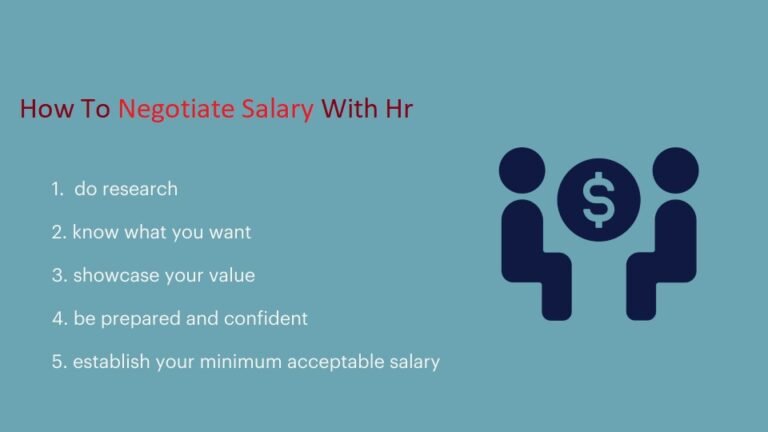Negotiating your salary with HR can be daunting, but it’s a crucial skill that can significantly impact your financial future. Proper preparation, communication skills, and confidence are key to securing a salary that matches your worth. In this complete guide, we’ll walk you through everything you need to know about How to Negotiate Salary with HR.
Understanding the Importance of Salary Negotiation
Salary negotiation is not just about money; it’s about recognizing your skills, experience, and contributions to the company. Failing to negotiate could result in you leaving money on the table.
Benefits of Negotiating Your Salary:
- Increased Earnings: Over a lifetime, negotiating effectively can lead to substantial financial gains.
- Professional Growth: Shows HR and management that you value your contributions.
- Building Confidence: Helps you develop stronger communication and negotiation skills.
Preparing for the Negotiation
Preparation is the foundation of successful salary negotiation. Here are some steps to help you get started:
Researching Industry Standards
- Understand Market Rates: Use platforms like Glassdoor, Payscale, and LinkedIn to find salary benchmarks for your role and location.
- Consider Additional Benefits: Evaluate perks, bonuses, and other compensation beyond base salary.
Evaluating Your Value
- Assess Your Skills and Achievements: List your accomplishments and their contributions to your current or prospective employer.
- Quantify Your Impact: For example, “Increased team efficiency by 25%, leading to $50,000 in annual savings.”
- Identify Your Unique Selling Points (USPs): Highlight what sets you apart from others in the same role.
Timing the Negotiation
When you choose to negotiate is as important as how you negotiate.
Best Time How to Negotiate Salary with HR
- After Receiving a Job Offer: This is when you have maximum leverage.
- During Performance Reviews: A natural time to discuss your achievements and expectations.
- When Taking on New Responsibilities: If your role expands significantly, it’s appropriate to renegotiate your salary.
Signs It’s Time to Ask for a Raise
- Consistently Exceeding Expectations: When your performance is clearly above and beyond your job description.
- Market Changes: If the industry standard salary for your role has increased.
- Company Growth: When your company is thriving financially.
Effective Strategies to Negotiate Salary
Building a Strong Case
- Document Your Achievements: Bring evidence of your contributions, such as performance reviews, awards, or metrics.
- Know Your Worth: Be clear about your salary expectations based on your research.
- Practice Your Pitch: Rehearse with a friend or mentor to build confidence.
Using Effective Communication Techniques
- Start with Gratitude: Thank HR for the offer and express enthusiasm for the role.
- Be Clear and Professional: Use phrases like, “Based on my research and experience, I believe a salary of $X would be appropriate.”
- Avoid Ultimatums: Instead of “I won’t accept less than $X,” say, “I’d be more comfortable if we could reach $X.”
Dealing with Common Challenges
Overcoming Rejections
- Stay Positive: If HR declines your request, ask for feedback or other non-monetary benefits such as flexible hours or additional vacation days.
- Propose a Re-evaluation Timeline: Suggest revisiting the salary discussion in six months.
Handling Counteroffers
- Evaluate the Offer: Consider if the counteroffer aligns with your expectations and long-term goals.
- Be Prepared to Walk Away: If the offer doesn’t meet your needs, politely decline and explore other opportunities.
Closing the Negotiation Professionally
End the negotiation on a positive note, regardless of the outcome.
- Express Gratitude: Thank HR for their time and consideration.
- Confirm the Agreement: Request the revised offer in writing for clarity.
- Maintain Relationships: Be professional, even if the negotiation doesn’t go as planned.
Frequently Asked Questions (FAQ)
| Question | Answer |
|---|---|
| When is the best time to negotiate? | After receiving an offer or during performance reviews. |
| How much should I ask for? | Aim for 10-20% above your current or initial offer, based on research. |
| What if HR says the salary is non-negotiable? | Explore other benefits like bonuses, equity, or vacation days. |
| How do I respond to a lowball offer? | Politely explain your expectations and provide evidence to support them. |
Disclaimer: The information provided in this article is for educational purposes only and does not constitute professional financial or career advice. Always consider consulting with a career coach or financial advisor for personalized guidance. The outcomes of salary negotiations depend on individual circumstances and organizational policies.

